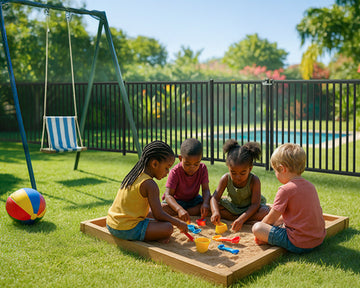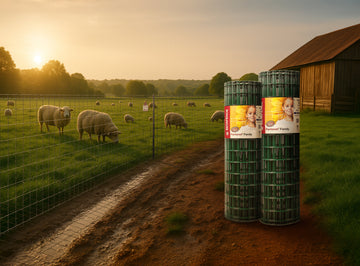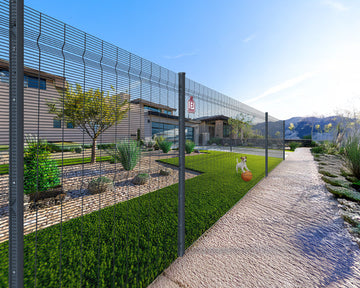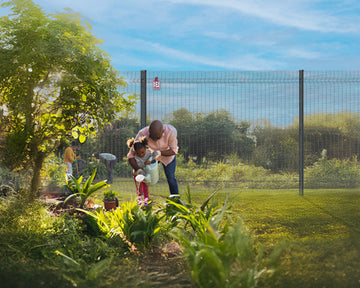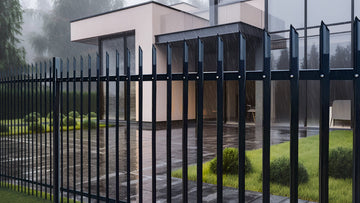
When choosing fencing material, it is essential to consider a variety of different factors. The ideal fence material should offer durability and longevity without significant maintenance. Most importantly, it should be secure and functional.
Let's take a look at some factors that might influence your fence material selection.
Durability and Longevity
One of the most important factors to consider when choosing a fencing material is whether it is durable and long-lasting. Material such as wood might offer a classic and natural look, but it is prone to rotting, warping and insect damage.
Concrete fences are known for their durability and resistance and have a much longer lifespan compared to wood fences. However, they can crumble and become brittle if impacted.
Galvanised steel wire mesh and palisade steel fences are highly durable and resistant to rust and corrosion, especially when powder coated or coated with PVC paint. These kinds of fences can withstand harsh weather conditions and are not susceptible to pest damage. They also offer superior strength and stability compared to other options on the market.
Maintenance Requirements
Owning a fence is a long-term investment, so a fence with little to no maintenance is a must.
Wood fences require a lot of maintenance to keep them in reasonable condition. This includes painting, sealing, and occasional repairs.
Concrete fences are virtually maintenance-free. However, if sections have started to crack or crumble, they will need to be replaced altogether. This could result in unexpected, significant costs in the future.
Galvanised steel wire fencing is extremely low-maintenance, requiring only the occasional clean to remove dirt.
Aesthetic Appeal
Wood is an attractive option, providing a traditional, rustic aesthetic that complements a variety of architectural styles. Moreover, wood can be painted or stained to match a variety of preferences.
Concrete fences are not typically chosen for their looks, as they offer little in terms of aesthetic appeal. These fences are mostly functional, but they can be painted to improve their appearance.
Galvanised steel wire mesh fencing is sleek, neat, and modern in appearance. It also provides greater visibility, creating a clear and transparent boundary that doesn’t obstruct the view.
Steel palisade fencing also offers a transparent boundary while providing superior strength and security.
Security and Functionality
Most importantly, a fence needs to provide good security and be functional as a security barrier.
Wood fences are not as sturdy as other fencing types and are therefore most commonly used as privacy screens or retaining walls.
Concrete fences are reasonably secure, but they are also simple to climb and breach. The concrete will break with just a few blows from a large hammer.
The best fencing material for security is galvanised steel wire mesh, as it is much stronger than other materials and is difficult to scale or breach. For this reason, it works incredibly well as a security barrier.
Palisade steel fencing is highly effective due to its robust steel construction, spiked and pointed tops, and vertical beams that make it difficult to climb. These design features are excellent for security purposes and act as strong deterrents against intruders.
If your preferred fence material selection is galvanised steel of the highest quality, then contact us at Betafence or check out our online store to see what we have on offer. We have ideal fences made from ideal fence material.
FAQs and Answers
1. What is the most durable fence material?
Galvanised steel wire mesh and steel palisade fencing are the most durable options, offering resistance to rust, corrosion and harsh weather.
2. Which fence material requires the least maintenance?
Concrete fences and galvanised steel fencing require very little maintenance compared to wood, which needs regular painting and repairs.
3. Are wooden fences a good choice for security?
Wooden fences are more suited for privacy and decorative purposes. They are less sturdy and easier to breach than steel or concrete options.
4. Can concrete fences crack over time?
Yes, concrete fences can crack or crumble with impact or over time, which might require full section replacements.
5. What is the best fence material for security?
Steel palisade fencing and galvanised steel mesh provide the best security, with strong construction and designs that are difficult to climb.
6. Do steel fences rust easily?
No, galvanised steel fences are treated to resist rust and corrosion, especially when powder coated or PVC coated.
7. Which fence material looks the most attractive?
Wood is considered the most attractive for a natural and rustic look, while galvanised steel mesh offers a modern and sleek appearance.
8. Where can I buy high quality galvanised steel fences?
You can purchase high quality galvanised steel fencing from Betafence by visiting our online store or contacting us directly.
